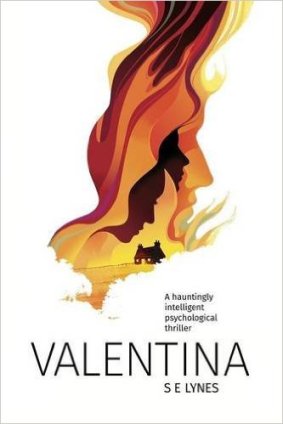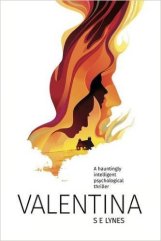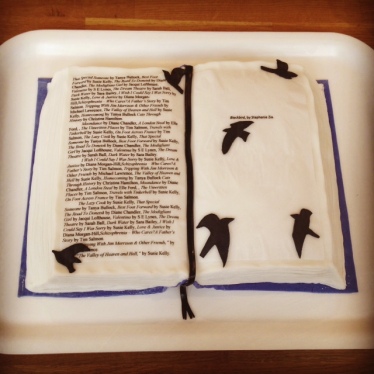
OK. I admit it. I’m a bit star struck today to have an interview with S E Lynes on Linda’s Book Bag as I absolutely adored her debut psychological thriller Valentina, my review of which you can read here.
Valentina was published in e-book and paperback by Blackbird Bookson 1st July 2016. Valentina is available for purchase on Amazon, and from all good book sellers like Waterstones. You can read the opening of Valentina by clicking here.
Valentina

When Glasgow journalist Shona McGilvery moves with her partner Mikey and their baby to an idyllic cottage in rural Scotland, they believe that all that lies ahead of them is happiness.
But with Mikey working offshore, the frightening isolation of the Aberdeenshire countryside begins to drive her insane…
That is, until she is rescued by a new friendship with the enchanting Valentina.
She has the perfect home, the perfect man, and a charismatic new best friend – or does she? As her fairytale life begins to unravel, the deep dark wood becomes the least of her fears…
An Interview With S E Lynes
Hi Susie. Thank you so much for agreeing to answer some questions on my blog about your writing and Valentina.
Firstly, please could you tell me a little about yourself?
I’m from the North West. I am married and have three kids: 17, 16 and 11. I’ve lived in Leeds, Paris, France, Oviedo, London, Aberdeen, Rome and now live in Teddington. I’ve had so many careers Barbie had better watch her back and my husband fully expects me to be an astronaut before I’m done. I ran a café in central London, I’ve been a reporter then a producer for the BBC in Aberdeen, been a stay at home mum who did a bit of writing/translation/voice-over work on the side in Rome and am now back in Greater London where I’ve a creative writing tutor at Richmond Adult Community College for almost ten years, a writing coach and a writer.
When did you first realise you were going to be a writer?
When my first novel was picked up by an agent in 2008ish. It didn’t get published but I began to write more seriously then and to see myself as a writer. I never thought I’d get published, as I always knew how difficult that was, but it was my dream. I wrote because I loved writing.
If you hadn’t become an author, what would you have done instead as a creative outlet?
I used to make radio programmes, so I might have returned to that. When I was at home with the kids I learnt how to bake because I was a bit crap at getting down on the floor and playing trains or dollies or whatever. I was terrible at baking – real ‘if you drop this on your foot it will hurt’ cakes. But I got better and now I still bake to relax and sometimes make not very perfect but made with love cakes for friends and family. I made a book-shaped cake for my publisher recently. I will try and attach a photo!

(That looks brilliant. I enjoyed playing spot the author on it too!)
How do you go about researching detail and ensuring your books are realistic? (If readers haven’t read Valentina they might want to skip this answer as there’s a slight spoiler!)
Google is ace! Especially for any time-poor writer who is spinning many plates. Google earth is amazing – I recently took a trip around Bainbridge, Washington and decided where a new character might live. I read novels too – so right now I’m reading David Lodge as I have a character who is at University in the late 70s and I’ll be looking for novels set in San Franscisco at the same time. What I’m after is historical details, yes, but also atmosphere, or vibe, and I think that is present in fiction in a way it isn’t in non-fiction. I also believe in the right to artistic licence. In Valentina, I used a fictionalised Aberdeen (although my good friend said ‘thanks for setting fire to my cottage’!).
Which aspects of your writing do you find easiest and most difficult?
I need to improve my research skills but in terms of the actual writing, I find knowing what to leave in and what to take out very difficult. You have to trust your reader but at the same time you have to be clear or the reader’s attention will be focussed in the wrong place. I also find shutting down distractions very difficult too – social media in particular – as I am a very sociable person and love joining in if there’s a joke going.
What are your writing routines and where do you do most of your writing?
I get the little one to school, walk the dog, sort laundry, tidy round etc then try and get to my desk before 11am. I then have to shut down all social media and focus. I sit in my study, which is quite dark and there is no view – just the wall of the house next door. People ask why I don’t work in the kitchen with a view onto the garden, or even in the shed – like a proper writer with a garret and everything – but I need totally uninspiring surroundings to enter the world I’m creating. I always tell my students never to wait for the muse – you sit down, you put your hands on the keyboard and you write, badly if necessary, and eventually you get in the zone.
When you’re not writing, what do you like to read?
Anything authentic, where the psychology of the characters has been properly thought through, where the voice is consistent and where the details bring the work to life, make it real. I like the work to make me think: ‘I know these people’. Expository or clunky dialogue makes me throw the book across the room, people reacting in a way no one ever would, characters undergoing a complete and sudden personality transplant in order to fit the plot…
I return time and time again to Alice Munro. I love her long short stories and her ability to analyse moments that would perhaps pass us by. I love Pat Barker’s visceral writing, Sarah Water’s storytelling. I had a phase of reading psychological thrillers in order to prepare to writeValentina, as I had not tried one before. I liked the quality of Gillian Flynn’s writing, I loved the description of the head on page one and how prepared she was to give us truly horrible characters. Now I’m back to reading more literary fiction as I want to write beautiful sentences and create some depth as well as tell a story. I loved All the Light We Cannot See by Anthony Doerr. I am currently reading The Ballroom by Anna Hope, which is exquisite. The plot can be amazing but if the writing isn’t great I don’t stick with the book.
(I agree. The Ballroom is an amazing book)
Do you have other interests that give you ideas for writing?
Life. I think having lived in a lot of different places has given me a lot of material. I go out a lot and love my pals and my family. I read a lot and watch films, good TV series like Breaking Bad. Valentina came from a flippant remark I always make – but I can’t tell you what it is because it would give the plot away. My last novel – unpublished – also came from a flippant remark: ‘sexuality is a spectrum,’ one of my friends quipped. That got me thinking and I wrote a novel full of sexually ambiguous encounters and relationships.
We can’t say too much about the cover of Valentina without spoiling the plot, but how did that image come about? (No spoilers please!)
I wanted something suggestive, iconic even. Something not similar to the other book covers in the same genre. My brother is Game of Thronesartist, Robert M Ball. I cook his Christmas dinner every year so he said he’d do it. His images are incredibly striking. I wanted something with fire on it but if it had been left to me it would have looked like a bad concept album from the seventies. So I sent him the synopsis and left him to it. He is a genius, which is irritating, frankly.
We can’t discuss the plot either for fear of spoiling the book for those who haven’t yet had chance to read Valentina, but how did you manage plotting? Did you use post-its, flowcharts, cut and paste or some other process?
I wrote it all as best I could, got it more or less to stand up like a rickety shed, then went round removing plot holes, or hammering in nails to continue the metaphor. I then mucked about with the end to make it more cat and mouse.
The iterative themes and images add layer upon layer of tension in Valentina. Did they arise naturally as you wrote or did you plan for them or add them in the editing stage?
I know my job is first and foremost to tell the story – so that is my aim: what does the character want? Why can’t she get it? What is she going to do to get it? But I wanted to look at trust, which is a big theme in my work – and in order to make the impact of this thriller felt, I had to make Shona represent ideals which fed into that theme. I wanted to look at class and privilege, how a certain entitled mentality can do great harm to those who are brought up to earn, to share, to be ‘good’. Feminism came into it in terms of the choices facing women and the judgments women make about one another. And I wanted there to be lots of fairy tale references in there too – there is a great Russian fairy tale, The Firebird and the Falcon, which is in there to be spotted or not.
(You know I’m going to have to read that tale and then re-read Valentina now don’t you?)
Valentina really explores the nature of identity and how well we know those we love. Why did you choose such a theme?
All writers have to find drama, otherwise there is no tension, nothing for the reader to worry about. Drama, also comedy, comes from subversion, in taking life as we recognise it and pulling the rug out from underneath. The theme of how well do we know those we love departs from another question: how well do we know ourselves? I have met people whose perception of themselves is so far removed from who they actually are and how they are seen, that it is scary. But scarier still is the thought: but what if I am like that too? I might think I’m entertaining company, for example, but who is to say my companions aren’t pulling out their own teeth just to stay awake? So I wanted above all to make the characters and the way they relate to each other highly realistic, highly recognisable. So I drew on what I knew – love and friendship – and subverted it.
I found the limited number of characters in Valentina really added to the claustrophobic feel. How far did you plan the characters to create this effect?
Absolutely spot on. I had read Gone Girl and Girl on a Train, among other high quality psychological thrillers and the limited cast added to the intensity. I also wanted it to be a novel, in the sense that there had to be some exploration of themes and characters, there had to be some depth.
If you could choose to be a character from Valentina, who would you be and why?
Good grief, I wouldn’t be any of the main ones! Jeanie, probably. She is the only character I have ever based on a real person – so I didn’t bother changing her name. She was my friend and mentor at the BBC, a person of great generosity and integrity. She read and lovedValentina but very sadly died before the book came out. I had written her into the book before I knew she was ill. The book is dedicated to her.
(Goodness, how poignant. I’m sure she would have been thrilled.)
If Valentina became a film, who would you like to play Shona, Mikey and Valentina?
Arrrrghhhh. That is so tough! My first instinct is to say no one famous because if it got made into a film I would love there to be opportunities for up and coming Scottish talent – actors, film makers, musicians. For Shona, I had Bjork in my mind for her physical appearance, so the actor would have to be small and pixie-like, with dark hair. So if we were going big, it would be Carey Mulligan for Shona, Sam Riley for Mikey and Emma Stone for Valentina.
Valentina has received rave reviews (mine included). How has that made you feel and what difference will it make to you as a writer?
It has been the longest sustained beautiful surprise I have ever had. Validation after ten years of writing into the void has been life-changing. The first surprise/shock was Rosalie Love at Blackbird telling me she wanted it. The next was Stephanie Zia, the owner of Blackbird, saying she agreed. It has given me confidence, something I have always struggled with. However, even now, if someone I like or admire is reading it, I am convinced this will be the person who says: nah. When I saw you were an English teacher, I had the same fear and was of course delighted when you loved it. I think for people to get this book, they have to understand that the reader is ahead of the protagonist up until the reversal – and that the tension is not coming from figuring out what is going on but from waiting for Shona to realise, taking the reader to a point where they are like a pantomime audience shouting ‘ he’s behind you’! What happens beyond that, the twist very near the end, I tried to keep as a surprise.
(I really did love Valentina and again my review is here.)
If you had 15 words to persuade a reader that Valentina should be their next read, what would you say?
I used to say: it’s only 99p, if you don’t like I’ll give you a quid and you can keep the change. But I’ll try harder:
Valentina will get under your skin and stay with you long after you’ve read it.
(Oh yes indeed it does!)
What are you working on now after Valentina?
I am working on a book with the working title of Rope. It is a psychological thriller again and centres around themes of one’s name, one’s identity, one’s place in the world. Oh, and hopefully it’s a right old yarn too. The main character is male this time so I am wearing trousers, watching a lot of football and taking an interest in cars. Not really. Now, where’s my pipe…
Well I can’t wait for Rope to arrive! Thank you so much, Susie, for your time in answering my questions. It has been fascinating finding out more about Valentina.
